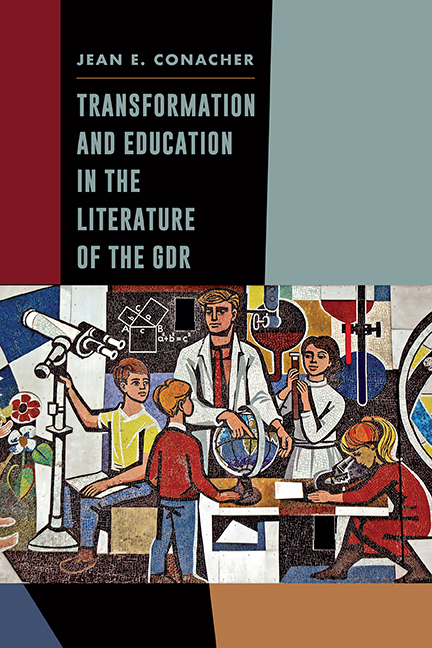Book contents
- Frontmatter
- Dedication
- Contents
- List of Illustrations
- Acknowledgments
- List of Abbreviations
- Introduction: The Postwar Desire for Renewal
- 1 Shaping the Cultural and Educational Landscape in the Soviet Occupation Zone (SBZ)
- 2 Interweaving GDR Education and Cultural Policy toward a National Literature
- 3 Critiquing the Norm in Steinmann' Die größere Liebe, Wolf' Der geteilte Himmel, and Kant' Die Aula
- 4 “Ich bin. Wer?“: Subjectivity and Transformation in Wolf' Nachdenken über Christa T. and Reimann' Franziska Linkerhand
- 5 “Wem geben wir Einsen … ?” Meritocracies and Reward in de Bruyn' Die Preisverleihung and Plenzdorf' Die neuen Leiden des jungen W.
- 6 “Mir geht es gut”: Challenging Stagnation in Hein' Der fremde Freund and H�ntsch' Wir sind keine Kinder mehr
- Conclusion
- Appendix A Text-Internal Functions of Narrative Triangle (Left Side)
- Appendix B Text-External Functions of Narrative Triangle (Right Side)
- Notes
- Bibliography
- Index
5 - “Wem geben wir Einsen … ?” Meritocracies and Reward in de Bruyn' Die Preisverleihung and Plenzdorf' Die neuen Leiden des jungen W.
Published online by Cambridge University Press: 25 March 2020
- Frontmatter
- Dedication
- Contents
- List of Illustrations
- Acknowledgments
- List of Abbreviations
- Introduction: The Postwar Desire for Renewal
- 1 Shaping the Cultural and Educational Landscape in the Soviet Occupation Zone (SBZ)
- 2 Interweaving GDR Education and Cultural Policy toward a National Literature
- 3 Critiquing the Norm in Steinmann' Die größere Liebe, Wolf' Der geteilte Himmel, and Kant' Die Aula
- 4 “Ich bin. Wer?“: Subjectivity and Transformation in Wolf' Nachdenken über Christa T. and Reimann' Franziska Linkerhand
- 5 “Wem geben wir Einsen … ?” Meritocracies and Reward in de Bruyn' Die Preisverleihung and Plenzdorf' Die neuen Leiden des jungen W.
- 6 “Mir geht es gut”: Challenging Stagnation in Hein' Der fremde Freund and H�ntsch' Wir sind keine Kinder mehr
- Conclusion
- Appendix A Text-Internal Functions of Narrative Triangle (Left Side)
- Appendix B Text-External Functions of Narrative Triangle (Right Side)
- Notes
- Bibliography
- Index
Summary
WHERE THE GDR's evolving identity had been largely dominated by changes in political direction in Moscow through the 1950s and 1960s, improvements in German-German relations in the 1970s resulted primarily from political developments in the United States of America and the Federal Republic instead. Increasing opposition to the Vietnam War, particularly among young Americans facing conscription, and a growing awareness of the impact of military action on the Vietnamese civilian population provided a focal point for protest movements centered on youth, gender, and civil rights that rapidly spread beyond the United States. In the Federal Republic, Kurt Georg Kiesinger’s Grand Coalition (1966–69) faced both external and internal pressures. Increasing opposition to the Vietnam War was coupled with strengthening nonestablishment voices critical of the power of the state, while, simultaneously, the first real domestic engagement with collective and individual actions in relation to the Federal Republic's national-socialist past began. Against this backdrop, Willy Brandt as Kiesinger's foreign minister had succeeded in easing cross-border tensions between the Federal Republic and the GDR. When the CDU/CSU were forced into opposition for the first time in 1969, Brandt used the next five years (until the Guillaume affair forced him to resign in 1974) to push through a more open Ostpolitik. The Hallstein Doctrine, which for nearly twenty-five years had hampered the GDR's international recognition, was discontinued, not least for its increasingly negative impact on the Federal Republic's own development. The Four Power Agreement on Berlin signed in September 1971 improved relations between the two sides of the city, allowing West Berliners to visit East Berlin for the first time since the building of the Wall, and led to mutual national recognition under the 1972 Basic Treaty and the admission of both countries to the United Nations a year later.
Changes in Direction for Cultural and Educational Policy
Just as Brandt wrought change in the Federal Republic, so, too, Honecker seemed to promise an alteration of course in the GDR, bringing to a close the hostility shown writers and artists at the 1965 Plenum. The more open environment he heralded was marked also by an apparently radical change in tone, as Honecker sought to focus on the positive achievements of the previous years, if still reinforcing the importance of “Wirklichkeitsnähe, Volksverbundenheit und Parteilichkeit” as guiding principles for writers and artists.
- Type
- Chapter
- Information
- Transformation and Education in the Literature of the GDR , pp. 144 - 173Publisher: Boydell & BrewerPrint publication year: 2020

